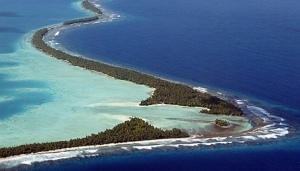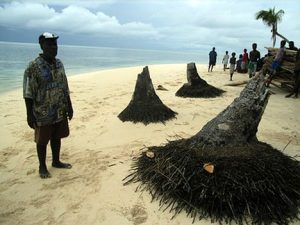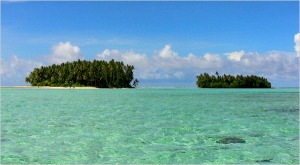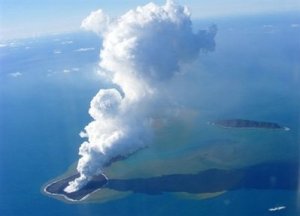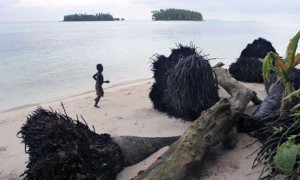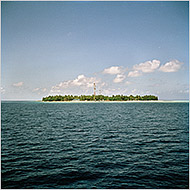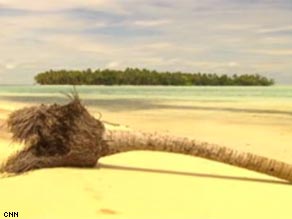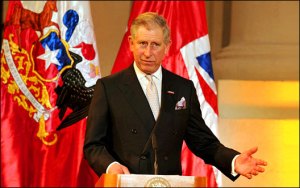Copenhagen Underway
Posted in Uncategorized
No Deal
From the NYT last friday:
The latest round of preparatory talks for the U.N. climate conference concluded today with negotiators lamenting that the languid pace of talks could mean there won’t be a deal on emissions in Copenhagen this December.
Meanwhile, from Brian Merchant at treehugger.com, First Official Climate Change Refugees Evacuate Their Island Homes For Good:
Check this link for the youth activists’ report. And Bill McKibben on The Colbert Report is worth a gander.
Posted in Uncategorized
World News
Palauan Ambassador and Islands First Board Chairman Stuart Beck breaks it down for the New York Times’ Neil MacFarquhar:
For the first time in history, you could actually lose countries off the face of the globe. It is a security threat to them and their populations, which will have to be relocated, which is a security threat to the places where they go, among other consequences.
And Tarita Holm, an analyst with the Palauan Ministry of Resources and Development:
It is about much more than just finding food and shelter. It is about your identity.
Posted in Uncategorized
Paint It White
It seems simple in the media. Recent coverage of the Carteret Islands and the Maldives brought sea-level rise to our attention, only to then say it’s not as bad as we thought (see here or here). Even news of a $528m pledge by the Japanese government to Pacific island nations framed the issue as merely one of sea-level rise.
Hopefully representatives at upcoming UNFCCC talks will have a more informed and nuanced perspective, as disappearing beneath the big blue is hardly the islands’ foremost climate change conundrum.
From the Solomon Star:
The Director General of the Secretariat of the Pacific Community, Dr Jimmie Rodgers, has written to Pacific Island leaders strongly encouraging inclusion of technical assistance for adaptation in national statements at the United Nations Framework Convention on Climate Change (UNFCCC) talks in Bonn from 1–12 June.
The 30th session of UNFCCC’s ‘Subsidiary Body for Scientific and Technological Advice’ (SBSTA) to be held during the talks provides an important opportunity for Pacific Island countries to negotiate for assistance to adapt to climate change.
“One of the main aims of COP 15 is to determine how to finance efforts by developing countries to engage in reducing emissions and adapt to the impacts of climate change,” he added.
“Pacific nations have an undisputed moral position at UNFCCC.
“But we can’t limit our statements to the urgent need for larger nations to mitigate emissions to levels that will prevent the tragic inundation of our low-lying nations and islands.
“We must negotiate for a much broader range of technical assistance to help us adapt to the inevitable environmental changes we will now face,” he said.
Dr Rodgers points out that even under best-case emissions scenarios, the Pacific is projected to experience major changes to the ecosystems that people depend on for food and livelihoods.
Projected higher air and sea temperatures, more intense rainfall in tropical areas, rising sea levels, acidification of the ocean and cyclones of greater intensity threaten the productivity of fisheries and agriculture and jobs associated with coastal infrastructure including resort areas.
Changing environmental conditions are also expected to increase the risk of water-borne and mosquito-borne diseases, especially in rapidly growing urban areas.
“Across all sectors, there is an urgent need to assess the vulnerability of food production systems, livelihoods and the health of our populations,” Dr Rodgers said.
But don’t think it’s only at the UN that these issues should be more fully understood and addressed. Check out, for instance, some work Seacology has been doing in Tuvalu. American Energy Secretary Steven Chu is even proposing the rest of us pick up on cues from islands with which we may be more familiar.
Posted in Uncategorized
Ursula
For more on the Carteret Islands, here’s a clip from Oxfam’s Sisters on the Planet campaign:
While you’re at it, check out Sun Come Up:
Sun Come Up is a documentary and multimedia project that follows the relocation of some of the world’s first climate change refugees, the Carteret Islanders. Part film website and part media hub, this is a place to learn more about the film, the issues, and to share your stories.
Posted in Uncategorized
Here, George
From George Monbiot’s blog at guardian.co.uk:
Journalists – they’re never around when you want one. Two weeks ago a momentous event occurred: the beginning of the world’s first evacuation of an entire people as a result of manmade global warming. It has been marked so far by one blog post for the Ecologist and an article in the Solomon Times*. Where is everyone?
And where, pray tell, was George when the islands were fighting back at the United Nations? Likewise Nicholas Schmidle, who last weekend in the New York Times Magazine covered another threatened island nation with which our readers are all too familiar.
Posted in Carteret Islands, Maldives, Refugees, Sea-level Rise
An Uneven Playing Field
An article by Joy Hyvarinen, director of FIELD, and Mike Shanahan, press officer at IIED, highlights the difficulties faced by vulnerable developing countries, such as small island states, in the UNFCCC negotiations.
From chinadialogue.net:
With less than nine months to meet the December 2009 deadline for a new global framework to tackle climate change, this week’s gathering in Bonn, Germany, of parties to the UN Framework Convention on Climate Change (UNFCCC) will be a critical negotiating session.
And while all right-thinking people agree that a new deal must be fair and equitable, the negotiations themselves are anything but. The talks risk focusing too much on reducing greenhouse-gas emissions, without paying adequate attention to the urgent need for vulnerable nations to adapt to inevitable climate-change impacts. If the rich world does not address these disparities, the negotiations could result in a broken deal that adds to the burden of the world’s poorest and most vulnerable people.
The current rules under the Kyoto Protocol commit a number of industrialised countries — but not the United States, which has not ratified the protocol — to reduce their greenhouse-gas emissions by set amounts by 2012, when the targets expire. Countries urgently need to agree replacement rules by the end of December, or there will not be enough time to enact them by 2012. The last thing a climate-constrained world needs is a period without any nation having binding commitments to reduce their emissions.
High on the agenda at Bonn will be new targets for both the developed countries and what might be the first binding targets for rapidly developing large countries, such as China and Brazil. But a certain level of climate change is already “hard wired” into the system, meaning that some impacts will be inevitable even if all greenhouse-gas emissions were halted today. So we need to adapt.
In fact, impacts are already being felt in the form of harsher and less predictable weather, melting ice caps, coral bleaching and rising sea levels. While we will all be forced to adapt to the impacts of climate change, it is often those least responsible for them — the least developed nations and small island states — that are the most vulnerable. But the international negotiations, which revolve around the competing power agendas of nations, are unfair to those vulnerable states.
Size matters — the big players are the rich, powerful states — but is not the only factor that comes into play in the conference room. Technical and legal expertise, as well as knowing how to play the negotiating game, can have a decisive role in determining outcomes. This means that most developing countries are on the back foot from the outset. They lack the resources and personnel they need to stand toe-to-toe with the big players.
At the last big climate conference in Poznan, Poland, the US delegation numbered over 80 representatives, while the small Pacific island state Kiribati, where climate change is a survival issue today, had only three and Congo had just two.
This matters because the negotiations usually break up quickly into many small groups to thrash out difficult issues. Delegates from the least developed countries and small island states must rush between groups, often late at night, getting very little sleep compared with larger delegations. And so they lose out. Such nations also have minimal capacity or time for crucial preparation, but it can take months of analysis to understand complex issues and their implications.
Meanwhile, the delegations from wealthy industrialised nations meet in advance to prepare their negotiating positions — and fallback strategies — bolstered by technical, scientific and legal advisers. Although some of the small island states have managed to punch far above their weight by having some exceptionally good negotiators, most of the vulnerable countries cannot claim that advantage.
A climate-change conference may need climate policy specialists, highly qualified scientists, legal advisers and experts in several other fields, such as forestry and agriculture, but most countries simply do not have the skilled staff or the resources needed. This can result in developing countries missing opportunities to influence decisions that could help alleviate poverty, such as the design of incentives for rainforest nations to avoid deforestation and forest degradation, which account for about 17% of anthropogenic greenhouse-gas emissions.
Equally, the deal that governments will be negotiating must include a robust and effective long-term plan for helping vulnerable nations to adapt to climate change. But there is a risk that the focus will instead be on mitigation because emissions, and any attempts to impose binding targets to reduce them, are the major concerns of the larger, more powerful states.
Despite their size and limited capacity to negotiate against much larger delegations, the Alliance of Small Island States (AOSIS) has succeeded in making its voice heard and has been a leader in promoting the moral dimensions of climate change. Likewise, the formation of a Least Developed Countries group that works together with a common negotiating stance has bolstered the weak starting point of these countries.
But the disparities in negotiating power remain. And while UN treaties have dedicated funds to support the participation of developing countries in the negotiations, these are voluntary and underfunded. The Least Developed Countries and the Alliance of Small Island States will need support from other nations to ensure that the deal strikes a fair balance between mitigation and adaptation concerns.
Some would say that the current situation is fair and that it is only to be expected that large rich nations have more say. Others would argue that to reach global solutions, which work for all states, international negotiations need to be based on a truly common agenda. Whatever the viewpoint, the playing field is not a level one.
Posted in Uncategorized
Slack
The collapse of an Antarctic ice shelf underscored the seeming ineffectuality of the latest UN climate talks that wrapped up this past week. As reported on Economist.com:
. . . with America’s tree-hugging new leadership in place, and with a green stimulus suddenly in vogue, the outlook for a deal at the climate jamboree in Copenhagen at the end of the year has brightened somewhat. So it was with keen anticipation that the first of a series of preparatory pow-wows opened last week in Bonn. . . . But the rapture soon subsided, as differences re-emerged over how fast and far countries should cut their greenhouse-gas emissions.
Things certainly aren’t looking any better for the small island nations of the world. While AOSIS may have rocked it, the conference was widely reported as a failure in regard to the leadership of developed nations.
Nevertheless, UNFCCC Executive Secretary Yvo de Boer tried to put on a happy face:
With all due respect to Mr. de Boer, islanders aren’t sitting around and waiting. From a recently inaugurated climate adaptation center on Mosuni to marine environmental protection on Reunion, check out what they’re up to with the help of their allies.
Even Barack Obama’s island home is taking the initiative. Or, perhaps, just trying to take up the slack?
Posted in Uncategorized
Faustian Pact
A video at National Geographic News illustrates Mohamed Nasheed’s concerns. The Maldives President announced plans this week for his nation to become the first carbon-neutral member in the family of nations. A symbolic gesture, to be sure, but one he’s convinced is necessary if small island states are to inspire the global action needed to prevent their homelands being rendered uninhabitable by climate change.
In spite of opinions to the contrary, the most recent scientific evidence indicates a peril even greater than initially predicted. And while President Nasheed’s announcement may have inspired another round in the media, it has yet to inspire many of us.
Well, some people are inspired.
But, after all, he’s an islander too.
Posted in Uncategorized
Capitol Climate Action
The snow covering the east coast of the United States hasn’t stopped climate activists in the nation’s capital. According to their web site as of this posting, all gates of the Capitol Power Plant in Washington, DC, have been occupied by protesters.
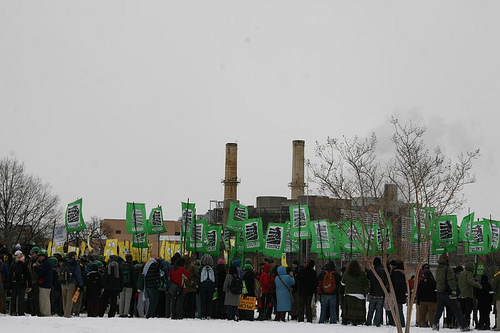
Check out Bill McKibben at Grist and coverage at the Guardian for the good news coming out of the concurrent Power Shift event carried out by youth activists in the American capital.
If you prefer egos and cynicism over such youthful exuberance, there’s always the hubbub that started with George Will at the Washington Post, only to have the torch strangely carried by New York Times enviro-guru Andrew Revkin. Joseph Romm is happy to set us all straight on the issues raised over at Climate Progress.
For some real news from those who have more at stake than their career as a talking head, Islands First recommends a few other places:
- The West Australian reports on efforts to protect Kiribati‘s freshwater supplies,
- The UN News Center covers housing problems induced by climate change in the Maldives,
- The Times of India brings to our attention a new film documenting climate refugees in the Sunderbans,
- And the first of a series on climate migration by Climatewire can be found here.
As always, here is where you can go to help. Thanks.
Posted in Activism, Kiribati, Maldives, Media, Refugees, United Nations, United States
Categories
- Activism
- Carteret Islands
- Coastal Erosion
- Coral Reefs
- Fiji
- Fish
- Food Security
- Friends
- Health
- Human Rights
- International Community
- Island Stories
- Kiribati
- Litigation
- Maldives
- Media
- Oceans
- Papua New Guinea
- Private Sector
- PSIDS
- Refugees
- Sea-level Rise
- Storms
- Torres Strait Islanders
- Tuvalu
- Uncategorized
- United Nations
- United States
